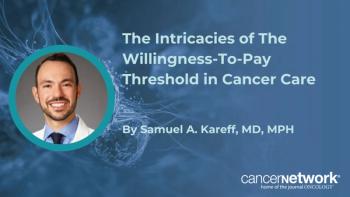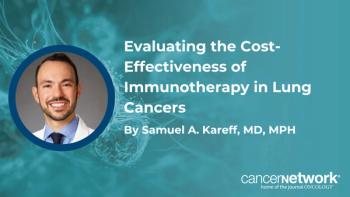
First-line Nivolumab/Ipilimumab Demonstrate ‘Deep,’ ‘Durable’ Activity
Treatment with nivolumab and ipilimumab is clinically active and has a manageable safety profile for chemotherapy-naive patients diagnosed with advanced NSCLC.
Frontline combination therapy with the PD-1 inhibitor nivolumab and the anti-CTLA-4 antibody ipilimumab is clinically active and has a manageable safety profile for chemotherapy-naive patients diagnosed with advanced non–small-cell lung cancer (NSCLC), according to a study of patient cohorts from the phase I CheckMate-012 trial. The findings were presented at the 2015 World Conference on Lung Cancer in Denver, Colorado (abstract
“First-line therapy with nivolumab plus ipilimumab demonstrates a high level of clinical activity characterized by deep and durable responses in advanced NSCLC,” reported lead study author Naiyer A. Rizvi, MD, of the Memorial Sloan Kettering Cancer Center in New York.
The study included 148 patients with advanced NSCLC (stage IIIB/IV NSCLC) with no prior chemotherapy for advanced disease, and an ECOG performance status of 0 or 1. Participants were administered one of four dosing regimens of nivolumab and ipilimumab:
♦ 1 mg/kg for both nivolumab (NIVO1) and ipilimumab, every 3 weeks (n = 31)
♦ 1 mg/kg for both nivolumab (NIVO1) and ipilimumab; NIVO1 every 2 weeks, ipilimumab every 6 weeks (n = 40)
♦ 3 mg/kg nivolumab (NIVO3) and 1 mg/kg ipilimumab every 12 weeks (n = 38)
♦ 3 mg/kg nivolumab (NIVO3) and 1 mg/kg ipilimumab every 6 weeks (n = 39)
RECIST v1.1 objective response rate (ORR) was assessed at weeks 10, 17, and 23, and every 3 months thereafter until progression.
All of the dosing regimens showed clinical activity, regardless of tumor PD-L1 expression, Dr. Rizvi noted. He reported a confirmed ORR of 13% to 39% and an “encouraging” median progression-free survival time of 4.9 to 10.6 months.
There were no complete responses; higher partial response rates were seen among patients administered NIVO3 regimens compared with those receiving NIVO1 regimens.
“Two patients in the NIVO3 [plus 1 mg/kg ipilimumab] group exhibited an unconventional ‘immune-related’ response with 56% and 64% maximum reductions in target lesions and simultaneous appearance of new lesions,” Rizvi noted.
There was a low frequency of treatment-related grade 3/4 adverse reactions leading to discontinuation, involving 10% or fewer patients, Dr. Rizvi reported.
Grade 3/4 treatment-related adverse events included skin reactions (3% to 13%), endocrine (3% to 8%), gastrointestinal (< 9%), and pneumonitis (0% to 3%).
Newsletter
Stay up to date on recent advances in the multidisciplinary approach to cancer.
Related Content




Evaluating the Cost-Effectiveness of Immunotherapy in Lung Cancers
















































